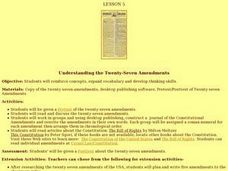Newseum
The First Amendment in Action Today
Young activists research a community issue and apply the rights defined in the First Amendment to develop a proposal that would solve the issue—using Pinterest's board "The Freedom to Make A Change Posters" as examples, groups design a...
Curated OER
First Amendment Rights
Learners consider the rights guaranteed by the First Amendment. They do this by viewing a seven-slide PowerPoint presentation the First Ammendment and the Bill of Rights. Once you have shown the presentation, hold a class discussion...
Library of Congress
The Emancipation Proclamation and the Thirteenth Amendment
How did the Emancipation Proclamation lead to the Thirteenth Amendment? Middle schoolers analyze primary source documents including the text of the Emancipation Proclamation, political cartoons, photographs, and prints to understand the...
C-SPAN
14th Amendment Equal Protection Clause
Two Supreme Court cases, Plessy v. Ferguson and Brown v. Board of Education take center stage in a activity about the Equal Protection Clause of the 14th Amendment. Class members research both cases to compare and contrast the rulings.
Curated OER
Latinos and the Fourteenth Amendment: A Primary Document Activity
Students explore Latinos and the Fourteenth Amendment. In this government and law lesson plan, students analyze the ruling in Hernandez v. Texas. Students predict how the United States would be different if the court had made an...
Judicial Learning Center
Your 4th Amendment Rights
Americans love to learn about their rights, especially those that protect them from the government's power to invade their privacy. Young people are especially engaged by this topic. An informative lesson explores four Supreme Court...
Classroom Law Project
What does the Constitution say about voting? Constitutional Amendments and the Electoral College
As part of a study of voting rights in the US, class members examine Constitutional amendments connected with voting and the role of the Electoral College in the election process.
Curated OER
Cartoons for the Classroom: Celebrating the 19th Amendment
Eighty-eight years after women earned the right to vote, a women ran for president. Young analysts consider the role women play in politics, how they are portrayed, the standards they are held to, and if they are still treated unfairly...
Curated OER
U.S. Constitution and Amendments
Students explore the framework of government and examine the Constitution to see its impact on their lives.
Library of Virginia
Emancipation and the Thirteenth Amendment
Why didn't the Emancipation Proclamation free all slaves? Young historians study primary source documents including Lincoln's proclamation and the 13th Amendment to the United States Constitution. Groups also investigate the three...
Carolina K-12
Minnesota v. White: Exploring a Judicial Candidate’s First Amendment Rights
After watching a documentary on the Supreme Court case Republican Party of Minnesota v. White, class members research how the First Amendment and free speech issues influence judicial elections and then conduct a mock judicial election.
Carolina K-12
The Twenty-Sixth Amendment and the Power of Youth
Empower teenagers to take political matters into their own hands! After completing an engaging warm-up activity, class members discuss both sides of the youth voting issue, learn about the connection between military history and the...
National Constitution Center
Federalism, the Commerce Clause, and the Tenth Amendment
How do the state and federal governments relate to each other? The Constitution has a lot to say about that! Using an interactive online tool, pupils explore the Tenth Amendment. They apply their knowledge to political cartoons and news...
Constitutional Rights Foundation
Elections, Money, and the First Amendment
Those who spend the most, win. Academics read informational text, participate in group discussion, and defend campaign reforms to understand the correlation between money, the First Amendment, and election results. The resource explains...
Oakwood Publishing
Workshop 4: Constitutional Convention
How do new amendments become part of the US Constitution? AP government students explore, analyze, and use the US Constitution to develop a deep understanding of the interworkings of law and government while practicing synthesis and...
Curated OER
Equal Protection of the Law: Fact or Fiction
High schoolers focus on the 14th Amendment of the Bill of Rights to decide whether or not racism denies citizens of their rights under the amendment. They watch a movie, Every Two Seconds and complete a worksheet (included in the plan)...
National Endowment for the Humanities
Cultural Change
High schoolers research the passage of the 19th Amendment as an illustration of the mutual influence between political ideas and cultural attitudes. They also read the Seneca Falls Declaration and explore the cultural shifts it both...
School Improvement in Maryland
Supreme Court Case Overview I
As part of a study of the 14th Amendment to the United States Constitution, class members examine four Supreme Court decisions—Gitlow v. New York, Mapp v. Ohio, Gideon v. Wainwright, and Griswold v. Connecticut—that incorporated the due...
Scholastic
The Right to Vote
Who used to have the right to vote in the United States? Who has the right to vote now? Amendments to the US Constitution that have changed the definition of eligible voters are the focus of a one-page worksheet that asks class members...
Curated OER
Our Constitutional Amendments
Learners analyze how the Bill of Rights affected people. In this U.S. History lesson plan, students research specific Amendments then prepare an oral report and visual presentation on one amendment to share with the class.
Curated OER
Understanding the Twenty-Seven Amendments
Students use the Internet to learn about the Constitution. In this Constitutional Amendments lesson, students read and discuss the twenty seven amendments and work in groups to rewrite the amendments in their own words. Students read...
Curated OER
First Things First: Using the Newspaper to Teach the Freedoms of the First Amendment
Students use the newspaper as a tool to make connections about what the five freedoms guarantee in the First Amendment. In this first amendment lesson plan, students analyze events in the newspaper to form conclusions about the freedoms...
Curated OER
Cartoons for the Classroom: The First Amendment? D'oh!
In this current events worksheet, learners analyze a political cartoon about First Amendment rights and respond to 3 talking point questions.
Curated OER
First Amendment Guarantee of Free Speech (Senior, Social Studies)
Students receive a list of banned books from which they choose one to read. They read their chosen book and write a paper that includes a discussion of the First Amendment and its guarantees and the reason(s) why they believe their book...
Other popular searches
- Constitutional Amendments
- Reconstruction Amendments
- First Ten Amendments
- Amendments u.s. Constitution
- Teaching the Amendments
- Ten Amendments
- 8th and 14th Amendments
- 13th, 14th, 15th Amendments
- 26 Amendments
- Us Constitution Amendments
- 10 Amendments
- 13th 14th 15th Amendments

























